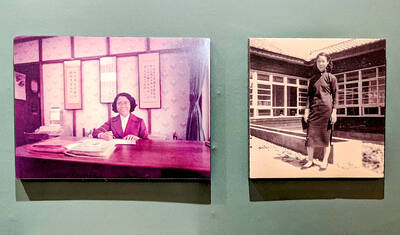Anne-Sophie Mutter is a special figure in the world of classical music. A child prodigy on the violin, she was taken up by Herbert von Karajan who conducted her in a performance with his Berlin Philharmonic Orchestra when she was only 13. She subsequently went on to enjoy an international career, recording numerous works and performing worldwide. Her current series of Taiwan concerts, plus a master class, is part of a short Asian tour — she will go from here to Shanghai, and then on to Japan.
In Taiwan, Mutter will play Brahms’ three violin sonatas (with Lambert Orkis, piano) in Taipei tonight, and in Kaohsiung tomorrow night. She will then play Dvorak’s Violin Concerto in A Minor with the National Taiwan Symphony Orchestra under Michael Francis in Taichung on Sunday and in Taipei on Wednesday. In addition she will give a violin master class on Tuesday.
For some reason, although the term “piano sonata” always means a work for solo piano, “violin sonata” generally means a work for violin and piano. Brahms wrote three such sonatas (there was another, written in his youth, that he destroyed). The first two of them are in three movements, the third in four. This final sonata is the most taxing and complex of the three.
Orkis is a frequent collaborator of Mutter’s, and earlier often accompanied the late cellist Mstislav Rostropovich. Mutter and Orkis’ new CD of the three Brahms sonatas was released last month by Deutsche Grammophon. They can be seen discussing this music on Mutter’s official Web site (www.anne-sophie-mutter.com).
Mutter has never recorded Dvorak’s Violin Concerto in A Minor. Who knows, perhaps her playing it in Taiwan will be a prelude to an eventual recording release. The work, though less popular than Dvorak’s Cello Concerto in B Minor, is well-known, and was given a stellar rendition by Chinese violinist Siqing Lu (呂思清) in Taipei in October 2006 with the Evergreen Symphony Orchestra.

Following the shock complete failure of all the recall votes against Chinese Nationalist Party (KMT) lawmakers on July 26, pan-blue supporters and the Chinese Communist Party (CCP) were giddy with victory. A notable exception was KMT Chairman Eric Chu (朱立倫), who knew better. At a press conference on July 29, he bowed deeply in gratitude to the voters and said the recalls were “not about which party won or lost, but were a great victory for the Taiwanese voters.” The entire recall process was a disaster for both the KMT and the Democratic Progressive Party (DPP). The only bright spot for

Water management is one of the most powerful forces shaping modern Taiwan’s landscapes and politics. Many of Taiwan’s township and county boundaries are defined by watersheds. The current course of the mighty Jhuoshuei River (濁水溪) was largely established by Japanese embankment building during the 1918-1923 period. Taoyuan is dotted with ponds constructed by settlers from China during the Qing period. Countless local civic actions have been driven by opposition to water projects. Last week something like 2,600mm of rain fell on southern Taiwan in seven days, peaking at over 2,800mm in Duona (多納) in Kaohsiung’s Maolin District (茂林), according to

Aug. 11 to Aug. 17 Those who never heard of architect Hsiu Tse-lan (修澤蘭) must have seen her work — on the reverse of the NT$100 bill is the Yangmingshan Zhongshan Hall (陽明山中山樓). Then-president Chiang Kai-shek (蔣介石) reportedly hand-picked her for the job and gave her just 13 months to complete it in time for the centennial of Republic of China founder Sun Yat-sen’s birth on Nov. 12, 1966. Another landmark project is Garden City (花園新城) in New Taipei City’s Sindian District (新店) — Taiwan’s first mountainside planned community, which Hsiu initiated in 1968. She was involved in every stage, from selecting

As last month dawned, the Democratic Progressive Party (DPP) was in a good position. The recall campaigns had strong momentum, polling showed many Chinese Nationalist Party (KMT) lawmakers at risk of recall and even the KMT was bracing for losing seats while facing a tsunami of voter fraud investigations. Polling pointed to some of the recalls being a lock for victory. Though in most districts the majority was against recalling their lawmaker, among voters “definitely” planning to vote, there were double-digit margins in favor of recall in at least five districts, with three districts near or above 20 percent in